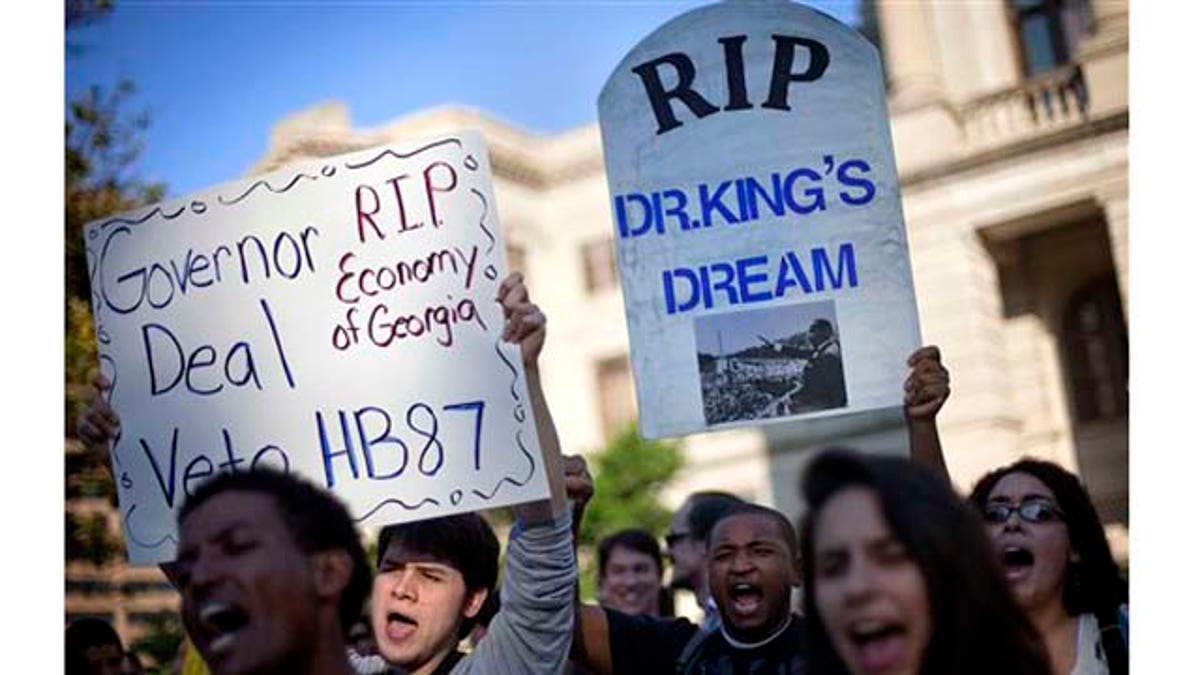
Jason Azurmendi, a la izquierda, Will Pesante, al centro, y Kristen Everett, a la derecha, todos de Atlanta, protestan afuera del Congreso estatal de Georgia por la controversial ley migratoria que fue aprobada el jueves 14 de abril. (Foto AP/David Goldman)
Georgia's new immigration law could lead to profiling and a reluctance by even legal immigrants to apply for work, some of the state's business owners and farmers say.
Republican Gov. Nathan Deal has pledged to sign the bill, which would require employers to use a federal database to make sure new hires are in the country legally. It also would allow law enforcement to check the status of people being investigated, even during a traffic stop, if they don't have an acceptable form of identification.
Business owners say the measure -- which some experts say would be the toughest on immigration in the nation so far -- could make non-citizen workers reluctant to apply for jobs and make hiring new employees more expensive and cumbersome.
Atlanta chef Chris Hall, who said he relies on an immigrant workforce, opposes the bill in part because of fears his workers could be subject to racial profiling.
"My guy's supposed to be here at 5, but if he's pulled over for being brown in his car on the way here and he doesn't get here until 6, that's a problem," said Hall, who co-owns Local Three restaurant. "A lot of us wonder, if you start taking away parts of our labor force, can we replace that?"
Hall, who said he follows federal requirements to ensure his employees are in the country legally, said that in 10 years of working in restaurants he hasn't seen a U.S. citizen apply for a dishwashing job.
Civil liberties and immigrant rights groups, as well as some Democratic lawmakers, have also raised concerns that possible racial profiling and strict hiring rules could cause both legal and illegal immigrants to leave the state, which they say would diminish the work force and hurt the state's economy.
The bill's sponsor, state Rep. Matt Ramsey, R-Peachtree City, has said illegal immigrants are a drain on the state's resources. He and law enforcement officials dismissed fears of profiling.
"We've got to have probable cause to make a stop, probable cause that a criminal or traffic offense has occurred, and probable cause is based on probable cause, not the color of one's skin," said Terry Norris, executive director of the Georgia Sheriff's Association.
The law -- which has provisions similar to a crackdown passed in Arizona last year that led to protests and court fights -- would allow officers to detain an illegal immigrant, though it's unlikely cash-strapped local jails will keep people in custody if they haven't been charged with a crime and won't be taken into custody by federal authorities, Norris said.
And officers won't necessarily check immigration status in every instance because they are authorized -- but not required -- to do so, meaning departments can craft policies that fit their communities, said Frank V. Rotondo, executive director of the Georgia Association of Chiefs of Police.
He said some amount of instruction will likely be necessary for officers in the course of ongoing training.
"We don't want to have a young, zealous officer attempting to enforce the law in a way he believes is correct and ending up doing something wrong," he said.
Meanwhile, farmers and others are worried about using the free federal database, E-Verify, to make sure new hires are in the U.S. legally. By July 1, 2013, all companies with more than 10 workers will have to use the system.
Aaron McWhorter of Whitesburg, about 45 miles southwest of Atlanta, already uses E-Verify for his construction company because it has public contracts, but he's loathe to implement it at his sod farm, he said.
"It's not difficult to use," he said. "But the process is kind of time-consuming and protracted because you can't prescreen people with it."
E-Verify can only be used once someone is hired. McWhorter said he has had instances in which he put people on payroll and started training them, only to find out the database indicated they were not eligible to work.
In some cases it was a mistake because of a misspelled name or other error. But if it's not, McWhorter said he's wasted time and money training someone he has to fire.
"Down the road, I see a shortage of labor," McWhorter said.
Supporters of the bill have said farmers and others can bring in unlimited seasonal workers through a federal guest worker program.
However, Bill Brim, a vegetable farmer near Tifton about 180 miles south of Atlanta, said it already costs him time and money to bring in 477 workers using that H-2A visa program. Having to use E-Verify for those workers and the other roughly 200 workers he hires locally will cost him even more.
"We'll have to hire somebody else to help implement the program," he said. "It's going to cost us money and already with H-2A we're spending so much money on domestic workers and H-2A workers because of all the stuff we have to do."
This is based on a story by The Associated Press.
Follow us on twitter.com/foxnewslatino
Like us at facebook.com/foxnewslatino




